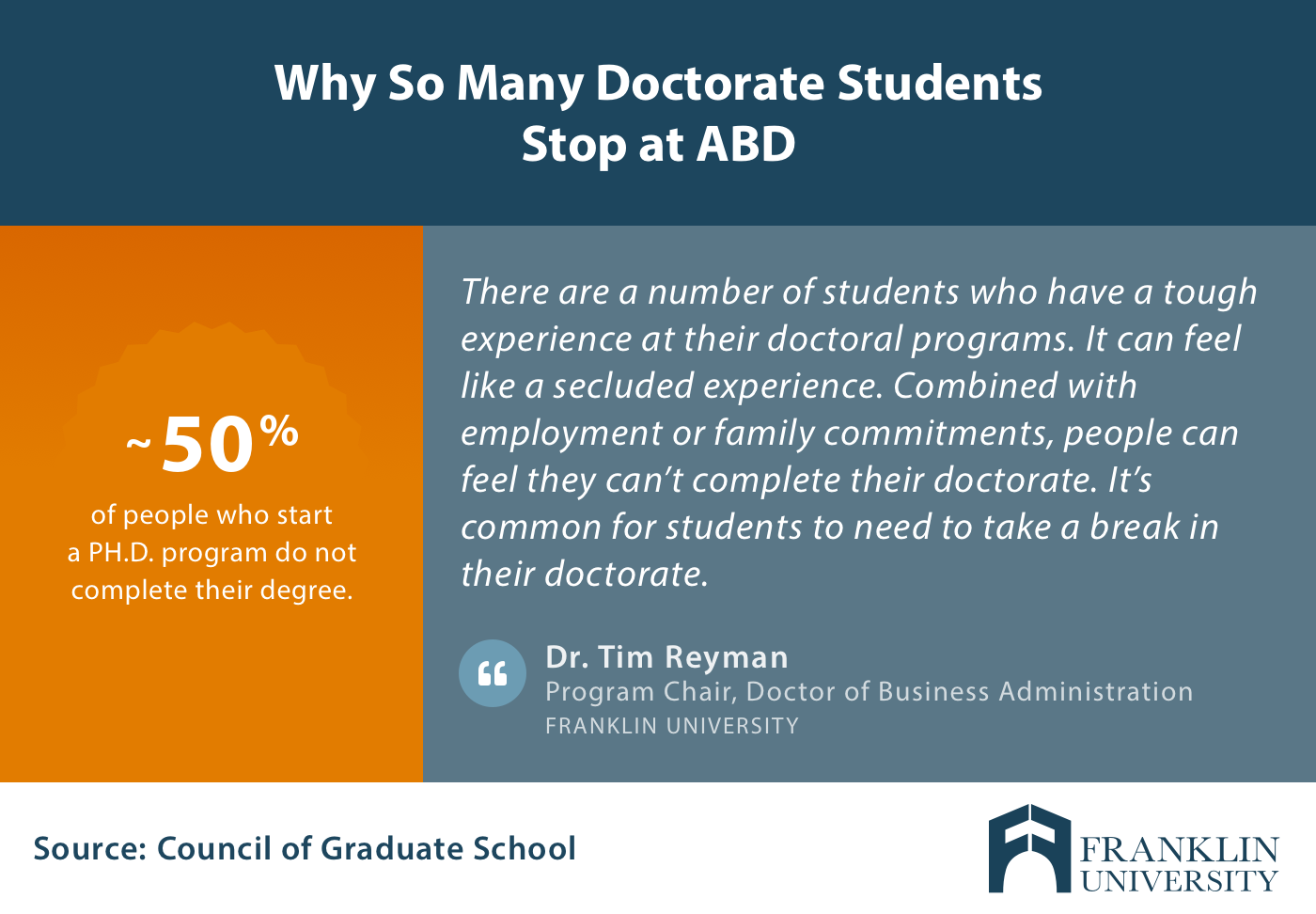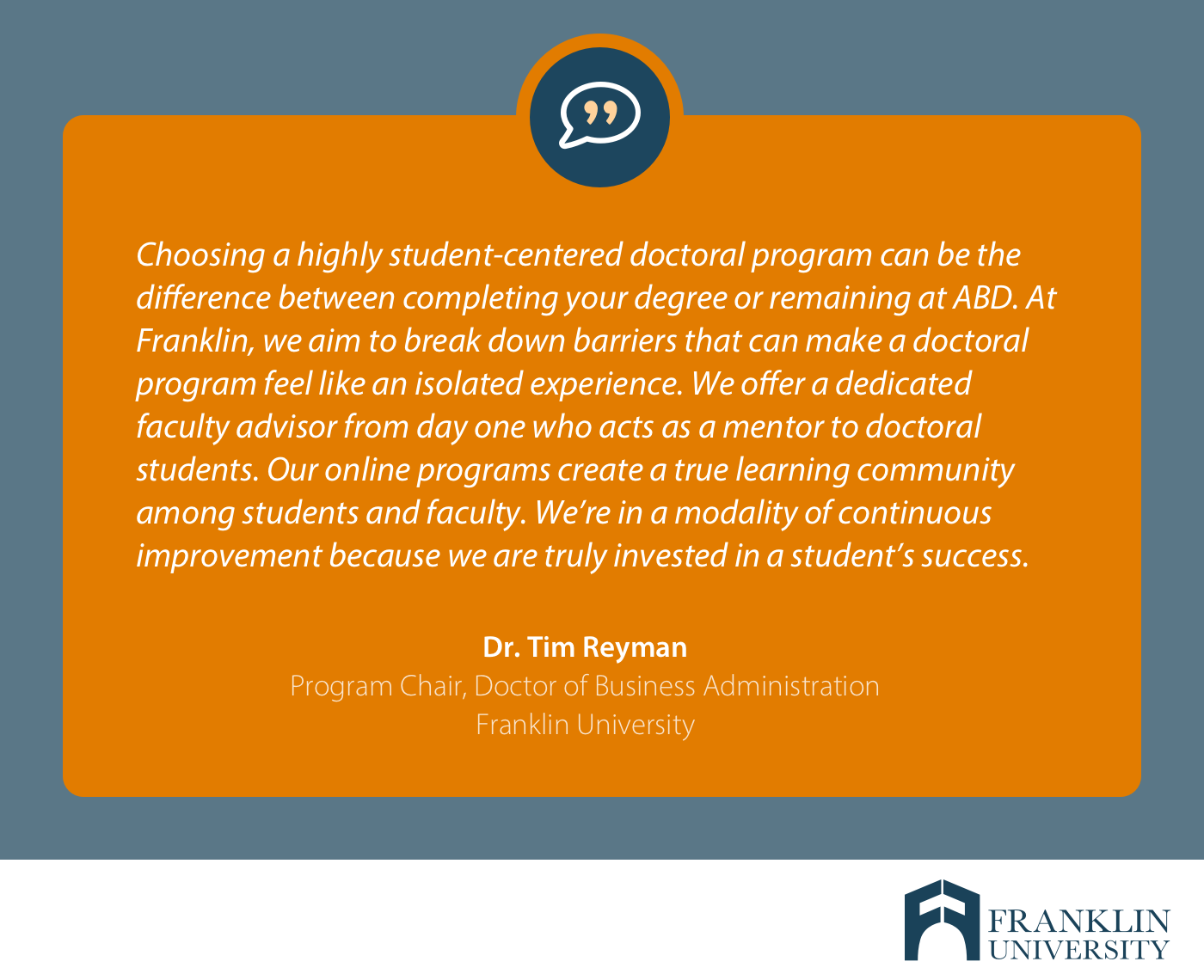Request Information
We're Sorry
There was an unexpected error with the form (your web browser was unable to retrieve some required data from our servers). This kind of error may occur if you have temporarily lost your internet connection. If you're able to verify that your internet connection is stable and the error persists, the Franklin University Help Desk is available to assist you at helpdesk@franklin.edu, 614.947.6682 (local), or 1.866.435.7006 (toll free).
Just a moment while we process your submission.

Setting The Record Straight: ABD (All But Dissertation) Degree Status
Doctorate degrees are a lifetime achievement that few individuals pursue and complete. In fact, according to leading labor market analytics firm EMSI, only 3.6% of degrees completed in 2020 were doctoral degrees.
It’s not surprising that doctorates are completed by fewer individuals. Doctorate degrees are intensive, requiring the highest levels of scholarly research and writing. For many people, the dissertation is the most challenging part of getting a doctorate degree. That’s why “ABD,” or “all but dissertation,” has entered the mainstream terminology of doctorate degrees. However, the term leaves many confused if ABD is a type of degree or not.
We’re here to help clarify what ABD means and how it relates to earning your doctorate degree.
Is ABD A Form Of A Doctorate Degree?
No. High-quality doctorate programs require the completion of a dissertation to earn your doctoral degree (with the exception of professional and clinical doctorates in areas like law and nursing). ABD simply means you have completed all required doctorate coursework, but have not written and defended your dissertation.
While ABD brings you one step closer to completing your doctorate, achieving ABD status doesn't mean you can take your foot off the gas. ABD doesn’t hold academic weight and you can’t be called a doctor until you finish your dissertation.
Unfortunately, many doctorate students stop at ABD. Let’s look at the reasons why.
Why So Many Doctorate Students Stop at ABD

There are a host of reasons doctoral students may dropout or take a break at the ABD stage of their doctorate program. Let’s look at some of the most common reasons students stop at ABD so you can navigate these pitfalls:
- Self doubt: Some students struggle with imposter syndrome and wonder if they’re really qualified to get their doctoral degree. Lack of confidence can leave students feeling unmotivated, causing them to put their degree on pause or dropout all together.
- Time Management: Once you get to the dissertation stage, you no longer have the structure of a typical course with weekly deadlines. Some students struggle with managing their time and fall behind. If procrastination gets the best of them, it may feel easier to quit than get back on track.
- Finances: Getting a doctorate degree is a significant financial investment. If students don’t properly budget, or face new financial challenges, they may pause their degree at ABD.
- Personal Circumstances: Whether students have family or professional changes, some situations that lead to ABD are unavoidable. If students need to take a break, they should put a plan in place for picking up where they eft off.
- Dissertation Intimidation: Starting a dissertation can feel like a stark departure from the familiarity of taking coursework. At this stage, students are put into the driver’s seat and are responsible for their own progression, which can feel daunting.
- Difficulty Writing: The dissertation is extremely research and writing intensive. Most dissertations are over 100 pages. If students struggle with focused and scholarly writing, it can be a detriment to finishing a doctoral degree.
- Lack of Support: Some students feel isolated when they move into the dissertation phase of their doctorate degree. If you don’t choose a program with support services or create a strong peer network, the solitary nature of a dissertation can deter students from finishing.
Earning a doctorate is challenging and rewarding, but do you know what to really expect? Download this free guide for tips and insights to help you prepare for success.
If you started but haven’t completed a doctoral program you aren’t alone. According to the Council of Graduate Schools, almost 50% of students who start a Ph.D. program don’t complete their degree. However, Ph.D. programs only represent one type of doctoral degree. Completion stats vary widely between universities and doctoral degree programs. The biggest difference in successful completion of a doctoral degree is often the university and program a student chooses. If you’re ABD, you need to find a student-centered program designed to meet the needs of ABD students.
Measuring Doctoral Student Success: Average Doctoral Program vs. Student-Centered Doctoral Programs at Franklin University
| Student Progress | Average Doctoral Program | Franklin University |
| Doctoral Students Who Graduate | 5.13% | 32.2% |
| ABD Students Who Complete Their Degree | 10.26% | 28.81% |
*Source: First Cohort Data January 2017-August 2021
Are you still feeling stuck at ABD? Let’s look at ways you can set yourself up to successfully complete your doctoral degree.
6 Tips to Complete Your Doctorate—from ABD to Dr.
No matter how long you've been ABD, you can regain your motivation and finish strong. Here are 6 tips that can help you graduate from your doctorate degree program:
- Get inspired early and start thinking about the topic of your dissertation at the beginning of your doctorate program. If you’re ABD, pick a topic you’re passionate about before restarting your doctorate.
- Create a plan that maps out steps and milestones to complete your dissertation in your desired timeframe. Being proactive and setting your own deadlines will help you stay on track.
- Get into a routine so that researching and writing your dissertation just feels like a normal part of your schedule.
- Develop a support system—both at home and in your program. Your family and friends can help you stay motivated, while faculty advisors, committee members and peers can make writing your dissertation feel more manageable.
- Practice self care, because a dissertation isn’t a sprint, it’s a marathon. Most students take anywhere from 1 to 2 years to complete the dissertation, but it can take longer based on the amount of time you commit.
- Find a student-centered university that offers dedicated support, including personal faculty advisors and a student support network, that make it easier to complete your doctorate.

Don’t Stop at ABD—Find The Right Program and Complete Your Doctorate Degree
Remember, ABD is not a recognized credential and there are ways to overcome the barriers that prevent many from finishing the work. A doctorate is the academic achievement of a lifetime and is attainable if you stay organized, motivated and dedicated.
Choosing the right doctorate program is the first way to set yourself up for success. Whether you’re starting from the beginning or picking up where you left off, you need a doctorate designed for your unique needs.
Franklin University offers transfer-friendly online doctorate degrees that help working adults achieve their goals. From start to finish, you can complete your doctorate degree in as few as 3 years, including your dissertation. Franklin doctorate programs accept up to 24 hours of transfer credit, so if you have completed coursework, but not your dissertation, Franklin can help you get over the finish line.
Explore the doctoral programs offered at Franklin to see if there is a program that will help you take your career to the next level.





